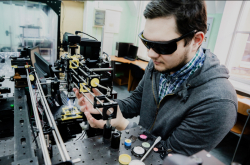You first started working with ITMO University ten years ago. What made you interested in partnering up with universities and taking a direct part in training specialists?
Most of my adult life I worked in academia. Later I was drawn to, so to say, more practical work, and so since 1999 I’ve worked at St. Petersburg Information and Analytics Center. At that point we were practically the first to create information analysis systems in St. Petersburg. At the same time we began working with a number of institutions – St. Petersburg Polytechnic University, North-West Institute of Management, ITMO University, Bonch-Bruevich University of Telecommunications. The idea to take part in training specialists came to us naturally, as we all worked then and are still working in the same field of informational technologies.
Later the Partnership for Development of Informational Society in North-West Russia (PRIOR) was created. It was headed by Andrey Chugunov, who is now heading the Department of State Information Systems Management at ITMO. It was there that we’ve become better acquainted with ITMO’s faculties and departments and since then have worked closely with the university. After some time we had the idea to set up a Master’s program focused solely on training specialists for work in government agencies. By 2011 the preliminary work was done and all of us – City Committee on IT and Communications, St. Petersburg Information and Analytics Center and ITMO University – developed the Master’s program “State Information Systems Management” and began to train Master’s students in this field.
In September 2017, the Department of State Information Systems Management will form a supervisory board for this Master’s degree program to which a number of representatives from the city’s various businesses and enterprises have been invited. How will this change the training that the specialists receive? Will the program become even more practice-oriented?
Absolutely – this is the current trend in education. As a former university employee, I understand that, on the one hand, a university must be conservative and ensure that students learn all the fundamentals, but, on the other, it needs to keep up with the times and pay attention to the development of science and technology, the concerns faced by government and business and to the careers of its future graduates.

Students at Department of State Information Systems Management, ITMO University
Back in the day, when we switched to a 2-stage educational system – Bachelor’s and Master’s degrees – we’ve started to short Bachelors and Masters on practical training. After all, the classic understanding of a Master’s program is that it is focused on research and scientific work that a Master can then continue in their Ph.D. and Doctoral studies. But at places of employment such deep scientific training is simply not in demand, especially with young employees. For that reason now a bigger part of Master’s students’ study time is allocated to practical training.
I’ve had a look at the list of people ITMO plans to have on the supervisory board. Among them are representatives of the businesses that are likely to employ future graduates from a specific, practice-oriented Master’s program. That is our common goal – for both the university and the city’s businesses – to provide such comprehensive training.
Which skills would you say a specialist needs if they plan on starting a career in the public sector?
First of all, they definitely need to be familiar with the basics of creation of information systems, to understand its principles and system architecture. The variety of information systems that are currently in use and which will be used in government and municipal agencies is not that large, but one still needs to become properly acquainted with them.
It’s important to note here that in Russia, as well as in all of the CIS countries, St. Petersburg is among the leaders in terms of scale of currently functioning systems. Today the St. Petersburg Information and Analytics Center is develops and supports a good half of all the state information systems in the city. We try to build them according to the same principles, on the same scientific and technological basis, and we hope that the students that will come to us for practice will adopt these methods. We invite them for work placement as well as for pre-graduation internships where they can take direct part in developing and providing support for the systems.
Despite all that, our goal is not to make them into programmers. They must learn the basic methods, know how to pose a task to a developer, how to competently develop design specifications, schedule working activities, approach issues systematically and to have the necessary analytical skills. What does it mean? It means that a specialist must be able to envision the results, the functionality of the future system, its basic principles and interactions with related information systems. They must be familiar with the information and telecommuncations infrastructure in the given region.

They must also be familiar with the technical and theoretical issues related to the creation of an informational basis. You could build a wonderful system, but it will be nothing but a “toy” if it lacks relevant, credible and sufficient information. We need a good product that will perform its functions – relieve government employees of their chores and grant them the time they need to solve administrative issues.
And, finally, one more task that we will soon begin to address can be found in the new Development Strategies for Russian Information Society from 2017 to 2030. This document includes a number of new terms, such as internet of things, digital economics, knowledge society, etc. These are areas in which information systems are already being developed. One of the main tasks that stands out in the document is imports phase-out, a transition to domestic hardware and software. This is a long-term process, but the fundamentals of its implementation – which are the creation and introduction of Russian-made software and technology – must be included in today’s Master’s degree programs. Because soon enough these graduates will begin to work on bringing these strategies to life.
So the need to be ready to perform this variety of tasks is what makes working in the state system, in governmental agencies, so different from working in a private company?
There definitely is a difference, and it’s in everything – in the development process, in how we service and operate a system. I’ll start with an easy example: in our system the specialists work 24 hours a day. You can’t just come to a data analysis center at nine in the morning and leave after six. When you work in a government facility, you need to understand the principles of system maintenance and round-the-clock support. You also need to be able to work with technical and normative documents. It’s a completely different level of responsibility.
In terms of creation and functioning of information systems, the difference is that they are all “legitimate” and are based on a law – a regional or a federal one, or, alternatively, a decree from the government of St. Petersburg. These things, too, need to be taken into account when training Master’s students – we need to teach them to compile bid documentation, take part in auctions, receive deliverables from developers – and it all needs to be very precise, from documentation guidelines to the content. Everything must be done according to government contracts. That is why there needs to be a multi-faceted system for training such specialists who could just come to a government office or any other state institution and immediately get to work.
Which specific tasks is the St. Petersburg Information and Analytics Center working on right now?

In our work we follow the goals set by the Development Strategies. There are 17 state programs, in five of which the City Committee on IT and Communication plays a direct part, and therefore do we. The top priority is this: there are two main parts to the executive government agencies’ authority: public services and public functions.
Public services are more socially oriented. We must ensure the quality of the rendered services and the government agencies’ availability and transparency. The latter is implemented through relevant web services. If these websites once used to only serve as information boards, now they present a two-sided interactive system – a user can make a submission, receive a reply and explanation.
But there are systems that perform the functions of certain government agencies – for instance, our own integrated analysis system. It doesn’t directly work with the citizens; it enables the activities of other government services, but when these agencies work better, the population’s issues are resolved more efficiently. This also relates to education, healthcare, construction, ecology and other systems. Our current task is to provide enough automated services for all government bodies so that all of our 18 districts are fully equipped with the needed tools.
The third main priority is the development of infrastructure: everything related to telecommunications, information security, interdepartmental interaction, etc.
In terms of improving the IT integration of government bodies in St. Petersburg, what do you see as the main tasks in the near future?
We will continue improving the quality of the electronic services that are currently being provided. Their number must increase, but at the same time the amount of paperwork one needs to provide to use them needs to become much lower. Through interdepartmental interaction, an agency needs to take it upon itself to find the correct documentation that proves, say, that you are eligible for a certain benefit or pension.
 Public services web-portal
Public services web-portal
Another direction we’re working in is the automatization of healthcare services. There is work being done in this area now, and it will continue. Right now the so-called HIS’s and LIS’s are being developed: healthcare information systems and laboratory information systems, respectively. Due to this, another issue becomes yet more relevant – the protection of personal data.
We’re also familiarizing ourselves with such a novel field as automatization of construction. For a while, St. Petersburg was falling behind Moscow in this regard – here, it took much longer to gain approval on paperwork and so on.
Among other prospective areas is safety – this includes road safety, traffic analysis and control, ambulance services control, street cleaning management. All the things that are part of housing, utilities and transport infrastructure will be united under the umbrella of the “Smart City” project. Just recently, a design solution for the project, to which our Rector Vladimir Vasilyev contributed, was approved by governor of St. Petersburg Georgy Poltavchenko.
All in all, two global system projects are being developed in our city – these are the “Smart City” project and the “Safe City” hardware-software complex. These projects will constantly evolve as science and technology improve day by day – there are always new solutions, new systems and tools and so on. What’s important is that we have a big headstart on all of these. Today’s Master’s program students can join us in this work – in their training, they will not only encounter “pure” theoretical work, but also work with what we already have and what still needs to be developed.







